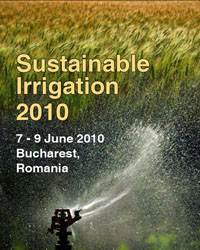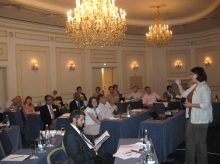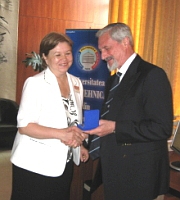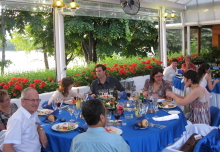Third International Conference on Sustainable Irrigation, Management, Technologies and Policies
7 - 9 June 2010
Bucharest, Romania
Overview
 The third International Conference on Sustainable Irrigation, Management, Technologies and Policies has recently taken place in Bucharest, Romania, organised by the University Politehnica of Bucharest and the Wessex Institute of Technology, UK, with the collaboration of the European Society of Agricultural Engineers and the International Commission of Agricultural Engineering. The Conference Chairmen were Professor Carlos A Brebbia of the Wessex Institute of Technology (WIT), Professor Anca Marinov of the University Politehnica of Bucharest and Professor Henning Bjornlund of the University of South Australia and University of Lethbridge, Canada.
The third International Conference on Sustainable Irrigation, Management, Technologies and Policies has recently taken place in Bucharest, Romania, organised by the University Politehnica of Bucharest and the Wessex Institute of Technology, UK, with the collaboration of the European Society of Agricultural Engineers and the International Commission of Agricultural Engineering. The Conference Chairmen were Professor Carlos A Brebbia of the Wessex Institute of Technology (WIT), Professor Anca Marinov of the University Politehnica of Bucharest and Professor Henning Bjornlund of the University of South Australia and University of Lethbridge, Canada.The meeting followed the success of the first two conferences which took place in Bologna (2006) and Alicante (2008). The conference discussed ways to achieve the most efficient and equitable use of water resources applied in irrigation, at the same time as ensuring their sustainability.
The objective of the conference series is to provide a venue for the international presentation and dissemination of papers related to sustainable ways of creating irrigation. Sustainable irrigation aims to develop ways of using scarce water resources most effectively to maximise food production while minimising the environment impact of irrigation on the different land and water resources. It also ensures that the extraction of water from surface and groundwater sources is set at sustainable levels to maintain healthy aquatic ecosystems to secure a continued supply of quality water for irrigation, recreation and urban or industrial uses. It also ought to facilitate an equitable distribution of the water available for consumption between competing users, which is essential to maintain sustainable communities.
Opening Addresses
The meeting was opened by Professor Anca Marinov who welcomed the delegates to Bucharest in the name of the Politehnica. She expressed her best wishes to all visitors from abroad, particularly those who had come from far away and hoped that they would see some of the sights in the city. Professor Marinov also explained that an excursion has been arranged to visit some interesting sights as well as a joint session at the Politehnica which will give them the opportunity to see the campus.Henning Bjornlund followed her remarks by explaining the aim of the conference and the importance of the topics to be discussed during the meeting. He organised a special session to highlight the need to involve the community in order to ensure eventual benefits. Irrigation is not only a technical problem but ought to take into consideration all socio-economic consequences.
Carlos A Brebbia then welcomed the delegates in the name of the Wessex Institute of Technology and explained the importance of these meetings to fulfil the objectives of WIT. WIT acts as a medium for knowledge transfer, activities that are carried out through meetings, publications and research, the latter particularly in close collaboration with industry and European Union partners. WIT collaborates with institutions all over the world.
Invited Presentations and Special Sessions
 The conference was enhanced by a series of invited presentations and special sessions. The invited contributions were as follows;
The conference was enhanced by a series of invited presentations and special sessions. The invited contributions were as follows;‘Decision models for better land management under cultivation’
by M Cunha, University of Coimbra, Portugal
‘Correlation between chemo-physical parameters and aquifer and impervious layer electrical resistance in groundwater’
by G Badalians Gholikandi, Power and Water University of Technology and Water Research Institute, Iran
‘Sustainable Irrigation – a new challenge?’
by H Bjornlund, University of Lethbridge, Canada, & University of South Australia, Australia
Other papers in the conference dealt with Modelling and Simulation, Irrigation Management, Environmental aspects and socio-economic issues.
A special session was organised by Henning Bjornlund, Co-Chairman of the meeting, on the topic ‘Farmers’ actions, environmental benefits and socio-economic consequences’ with a substantial number of papers dealing with these important issues.
Hromadka Award
The conference formal session was convened at the Aula Magna of the prestigious Politehnica University of Bucharest. The session was chaired by the Rector and comprised three keynote addreses.Professor Marian Gheorghe, Vice-Rector for International Affairs and Professor of Mechanical Engineering explained that the University is the most important technical institution in the country. He welcomed Professor Carlos A Brebbia, as PhD Honoris Causa of his institution and as such member of the Senate as well.
Professor Gheorghe described some of the activities of the Politehnica in terms of international links and participation in different types of programmes. He likes to encourage these activities and hoped that some of the participants will, in due time, consider becoming partners with the Politehnica.
His address was followed by Professor Carlos Brebbia’s remarks.
“Thank you very much Professor Marian Gheorghe for your welcoming remarks and for the help we have received from your prestigious Institution in organising these conferences with the collaboration of your staff, particularly Professor Anca Marinov.
“I hope that these initiatives will be the beginning of future programmes of collaboration in research and training activities. My Institution, the Wessex Institute of Technology, will be honoured to participate in any joint programmes.
“For me personally it is a great pleasure to be back at the Politehnica, particularly in this room where I had the honour of receiving a PhD Honoris Causa in 1994, followed by the delivery of my commencement address on the topic of numerical modelling of engineering problems using boundary elements.
“It is also rewarding to see how much Romania has changed since then and how beautiful Bucharest looks now, in spite of the economic problems that this country, as in most others, is suffering now. These problems – common to many nations - are transient and will not seriously affect the continuous development of Romania as a full member of the European Union.
“We have been planning these meetings for a long time and their success was dependent on the good will of everybody around us. We were pleasantly surprised by how friendly and helpful everybody has been towards us. This is the most important ingredient for the success of our meetings and we are grateful to the Politehnica in particular for their continuous support.”
Professor Brebbia then proceeded to introduce the first of the keynote speakers, Professor Henning Bjornlund, who gave a talk on ‘Sustainable Irrigation; complexity, issues and challenges’.
“Henning Bjornlund is Associate Research Professor at the Centre for Regulation and Market Analysis, University of Southern Australia as well as Research Chair at the University of Lethbridge in Canada.
“He had a very varied and interesting career, starting as a teacher in his native Denmark until becoming more adventurous and working on tropical farming in the Cayman Islands.
“This was the turning point in his life. After four years in the Cayman Islands he went to Australia where he finished a Bachelors in Business Real Estate and proceeding to complete a PhD on Business and Management on Land and Water. Following this he became a Lecturer at the same University of South Australia.
“Since then he has received a series of prestigious awards and honours on topics related to water studies.
“Henning’s achievements are many, including a long series of grants from prestigious Australian and International Institutions. His contributions to the international scientific community in terms of Conference organisation, reviewing and refereeing, committee work and the like is impressive and demonstrates as well as his commitment to society as a whole.
“Henning’s list of publications comprises nearly 250 of which 100 or so are refereed. He has written four monographs and edited books and nearly 30 book chapters.
 “Henning’s output is nothing short of outstanding.
“Henning’s output is nothing short of outstanding.“His collaboration with WIT has produced excellent results through his participation in the Sustainable Irrigation conferences, for which he has organised special sessions. He is also the Editor of a book recently published by our publishing division, WIT Press, entitled ‘Incentives and Instruments for Sustainable Irrigation’.
“In view of his outstanding achievements, I would like to express the appreciation of our Institute by awarding Henning in the name of our Board of Directors, the WIT Medal to Eminent Scientists. This medal that started in 1995 has been received by over 30 colleagues, each of them internationally renown.”
The next speaker was Professor Anca Marinov of the Politehnica who spoke on ‘How Sustainable Irrigation can improve soil and groundwater quality’. Professor Brebbia introduced Professor Marinov as follows;
“Anca is Professor of Fluid Mechanics at the Politehnica University of Bucharest in the Department of Power Engineering. She has a Masters and PhD from this University, and latter on the topic of Groundwater Pollution. She has been visiting Associate Professor at Middlesburg College, Vermont, USA and visited many other Institutions abroad. She is a researcher at the Romanian Academy, Institute of Mathematics, Statistics and Applied Mathematics.
 “She has carried out research on;
“She has carried out research on;- Mathematical Modelling of Waves in Lakes
- Transient movement in long pipelines
- Groundwater Hydrodynamics
- Pollution Dispersion in Groundwater
- Unsaturated Soil Pollution
- Nitrogen Contamination
- Hydropower Engineering
- Hydrology
- Environmental Problems
“Because of all her achievements I would like to take this opportunity to award Anca the Hromadka Medal that was instituted by a Member of our Board of Directors.
“The Prize was launched five years ago by Professor Ted Hromadka, who sits on the Board of Directors of WIT and is recognised worldwide for his pioneering research in developing new computational techniques; as well as for his professional engineering work on hydraulics and hydrology. He has numerous publications, including papers and books and has helped to develop better studies of practice in his native California. Until recently he was Professor at the State University California at Long Beach and is now Professor at West Point Academy.”
Carlos then proceeded to Award the Medal before she started delivering her keynote address.
The next keynote address was given by Dr Vasile Turcu from Terra Preta. Vasile graduated as a Physicist from the University of Bucharest and went to obtain a PhD degree from the University of Utah in the USA.
He is founder and owner of the research company called Terra Preta after working at the Meteorological Office of Romania. His work now involves consulting on soil properties, including developing new instrumentation.
Vasile – Carlos said – symbolizes the new spirit of business and enterprise in the country, helping to develop links between academia and industry. This is something that has taken a great deal of time and effort to achieve in most other EU countries. As a matter of fact many academic systems with the EU are still too conservative - Carlos thought, in terms of developing efficient models to serve the needs of society as a whole and wealth creation in industry. Vasile’s efforts need further encouragement.
Excursions
 The conference offered many occasions for the delegates to meet in an informal setting, not only during the coffee breaks but also at lunches, excursions and dinners arranged by the organisers.
The conference offered many occasions for the delegates to meet in an informal setting, not only during the coffee breaks but also at lunches, excursions and dinners arranged by the organisers.A special excursion was organised for all participants to see some of the most important sites around Bucharest. They saw the Metropolitan Cathedral which is located in downtown Bucharest. The Cathedral was built in 1820 but its dome collapsed in the 1826 earthquake and was rebuilt much later on.
The other highlight of the excursion was the Village Museum which contains a variety of houses, churches and mills. The exhibit area is under the directorship of Iulianna Ciotolu who acted as host, and has participated in other WIT conferences in the past.

The party also visited the Palace of the Parliament, which was built during the government of the late Ceausescu regime as the seat of his political administrative powers. It is now a multi-purpose building containing both Chambers of Parliament.
At the end of the tour, the delegates were taken to a well-known restaurant overlooking Lake Herastrau where the conference dinner took place.
International Scientific Advisory Committee

The meeting of the International Scientific Advisory Committee took place over dinner in an excellent restaurant where the delegates had occasion to try, in addition to typical dishes, some of the wines for which Romania is renown. The discussion centred on the possibility of widening the scope of the conference by emphasising topics such as drainage and land reclamation. Several possible locations were discussed for the conference which is to take place in 2012.
Publication of Proceedings
The proceedings of Sustainable Irrigation Management, Technologies and Policies III, 272pp (Print ISBN: 978-1-84564-446-8; Online ISSN: 1743-3509) are available from WIT Press priced at £103/US$206/€144. Orders can be placed online at www.witpress.com or by email:Papers from the conference will also be hosted online in the WIT eLibrary as Volume 134 of WIT Transactions on Ecology and the Environment (ISSN: 1743-3509). For more details visit the WIT eLibrary at http://library.witpress.com


 Wessex Institute
Wessex Institute